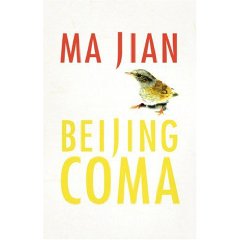Okay I realize it’s been awhile since I posted, but I’ve been in a bit of a coma — a coma created by Ma Jian. His latest novel Beijing Coma  is what did it.
 The book is about the events in the building to that June day in 1989, and told through the memories of a protester, Da Wei, who was shot in the head and is in a coma as the novel begins. His memories narrate the story of how he got to his present state.
The book is about the events in the building to that June day in 1989, and told through the memories of a protester, Da Wei, who was shot in the head and is in a coma as the novel begins. His memories narrate the story of how he got to his present state.
Sounds interesting right? Wrong. It’s heavily political and reads more like a political history textbook. I’m a fan of Ma Jian and I loved his first three books, but I could not get past the first 160 pages of this book. He just got too political and he wanted to put all his problems and issues into the novel and just came out with a very dry text. The book doesn’t breath — I don’t feel like I know the characters, but I do know Ma Jian’s political views. And they’re a little too extreme for me.
I don’t want this review to sound like a total downer. I’m sure a grad student of Chinese studies will love this novel, but the casual reader or even the seasoned Old China Hand should avoid this unless they need to take a nap.








Pingback: My Writing in Other Places at One-Eyed Panda’s Journal
Talking about this is a bit more depth with you last night has me curious about the book – if only to see if my opinion about it would be the same.
Not to make too sweeping a generalization, but I believe that many of the ’89 dissidents overseas are a bit out of touch with where China is 20 years later.
And, as those days largely defined their lives, it’s not too big of a stretch to wonder if maybe they cling to the idea of it a little too strongly.
Ryan, I agree with you. Reading some of the articles that Ma Jian wrote in some major British papers to promote the book, it sounded like he still see China as the same way it was in 1989. That really makes him seem out of touch.
J.
I liked Ma Jian’s first book although have yet to read any others. I also met a couple of Chinese in Australia a few months back who got to Aus as ‘refugees’ from the ’89 student movement. One of the guys was very anti-China, although from what he was saying, he also doesn’t realize that the place has changed in the past two decades. I mentioned that I work in an internet company here, but he refused to believe that China has internet at all…talked to him and one of his friends a few times, but they were both stuck in the ’89 time warp and didn’t want to acknowldge that many things are different now.
@Dace maybe they’re afraid to admit they missed out on China’s economic miracle by remaining too political?
J.
Ma Jian’s Red Dust was one of the novels I read prior to coming to China, and I really enjoyed it…kind of like “On the Road” Chinese-style. It was fresh, and felt dangerous, rather than being dry with politics. Thoroughly recommend it.
Good to be reminded of Ma Jian, I might try and track down some of his other stuff, though Beijing Coma, title and content, sound a little heavy for me.
Hi Tam
I agree with you, “Red Dust”, “Stick Out Your Tongue” and “The Noodle Maker” are all worth reading, but “Beijing Coma” unfortunately isn’t.
J.
J.